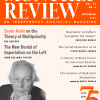
Every week, another
A new poem by Marge Piercy. | more…

Preface to the German Edition of Marx’s Ecology
John Bellamy Foster returns to his impactful Marx’s Ecology (Monthly Review Press, 2000), for this new introduction for the recent German translation of the book (Marx’ Ökologie, Edition Assemblage, 2024). “There is no longer any question,” he concludes, “about the depth of Marx’s metabolic critique…or its centrality in terms of the philosophy of praxis in our day.” | more…

The Attenuated Politics of Popular Luddism
Mark Allison reviews Brian Merchant’s timely Blood in the Machine (Little, Brown, and Co., 2023), finding in it a compelling historical account of the original Luddite movement with important parallels to our own age of Big Tech. However, Allison asks, are the lessons drawn from Blood in the Machine even possible within the confines of capitalism? | more…

New Biography of “China’s First Communist” Reveals Nuances for English-Speaking Readers
Joel Wendland-Liu reviews Li Dazhao: China’s First Communist, by Patrick Fuliang Shan (SUNY Press, 2024). This first-ever English-language biography of Li, a founding member of the Communist Party of China, Wendland-Liu writes, contains not only new scholarship but a fresh approach to the life of this revolutionary figure. | more…

Ancient Marxist History
In this review of Andrew Drummond’s The Dreadful History and Judgement of God on Thomas Müntzer (Verso Books, 2024), Paul Buhle explores how the influence of this Christian priest reverberated throughout the centuries, inspiring generations of future revolutionaries—including Karl Marx himself. | more…

November 2024 (Volume 76, Number 6)
Monthly Review editors elucidate Samir Amin’s concept of “delinking” in the context of the rise of global multipolarity. Delinking, they write, does not aim to isolate individual nations and populations economically, “but rather finding a way to sever connections with the main mechanisms of imperial dominance.” | more…

The New Denial of Imperialism on the Left
John Bellamy Foster returns to the touchstones of anti-imperialist Marxist thought, found in the works of V. I. Lenin, Samir Amin, and others, in order to confront the rising denial of imperialism on the left. This worldview and its consequences, he writes, has troubling implications not only for the superexploited workers of the periphery, but for all of the workers of the world, and for the internationalist character of contemporary Marxism. | more…

Hegemony and the Subaltern in Kafka’s “Josephine the Singer”
Christian Noakes invites readers into a literary exploration of Franz Kafka’s short story, “Josephine the Singer.” After all, as the author notes, “Kafka’s often nightmarish stories reflect many of the social, political, and cultural dynamics inherent under capitalism.” In applying this notion to “Josephine the Singer,” Noakes discovers a tale that describes not only the mechanisms of domination that constrain us, but the possibilities of a new consciousness, and a new world. | more…

The Social Dialectics of AI
In this deep dive into the world of artificial intelligence, Pietro Daniel Omodeo employs the frameworks laid out in Matteo Pasquinelli’s The Eye of the Master to weave a sociological history of AI that begins with the class struggles of the Industrial Revolution and continues into the context of early twentieth-century computing, which eventually gave rise our current Information Age. “AI,” he concludes, “sheds light onto the intellectual component of labor in all ages.” | more…

A History of Black Power We Need and Deserve
Say Burgin reviews Stayed on Freedom: The Long History of Black Power through One Family’s Journey, an account of the fight for Black Power as told through the Simmons family, and particularly, Michael and Zoharah Simmons, from their first meeting during SNCC’s Atlanta Project to their later painful struggles as a family. The story that shines through, Burgin writes, is a story of Black Power that is deeply personal, often messy, and, above all, a refreshing challenge to popular narratives that serve to demonize the history of Black Power and the radicals who devoted their lives to the struggle. | more…

Bit Despotism: The Genesis of High-Tech Monopolies
In this review of Bit Tyrants by Rob Larson, Mateo Crossa finds and expands on how the powerful actors of Silicon Valley have fashioned themselves into the new, unapologetic robber barons, operating in the shadows of political lobbying to maintain their monopolistic practices in the Global North while shamelessly engaging in the naked exploitation of the workers in the Global South. Crossa echoes Larson’s call for liberation from these tyrants, bringing attention to the necessity of socialism—both on- and offline—to agitate for democratic control over the technology and Internet platforms that increasingly penetrate our daily lives. | more…

My Notes on ‘The Return of Nature’
In August 2020, ecosocialist thinker, MR author, and jazz musician Paul Burkett wrote to MR editor John Bellamy Foster about the latter’s recent book, The Return of Nature (Monthly Review Press, 2020). Burkett’s short correspondence revealed his deep understanding of the throughline tying the ecologically inspired thought of Marx and Engels to the later innovations of Roy Bhaskar, Richard Levins, Richard Lewontin, and others, all the way up to Foster’s own work demonstrating that these developments are not isolated, but part of an evolving ecosocialist tradition. | more…

October 2024 (Volume 76, Number 5)
It is undeniable that the rapidly worsening ecological crisis is threatening not only future generations, but the youth of today. Why, then, is the U.S. educational system failing to teach students the reality of this human-caused catastrophe? “Even science itself,” MR editors write, “is to be sacrificed on the altar of capital.” | more…